Starting a podcast: how are you going to publish it?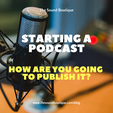 Happy Friday one and all. I hope you've had a good week. This is the last post in this Starting A Podcast series, so I hope that you've found some of what I've written useful. When a podcast is commissioned the finished episodes are published on the broadcaster's platform, like BBC Sounds etc. If, however, you are publishing your podcast yourself there's an almost overwhelming amount of choice of podcast hosts, with everything from free to expensively priced tiers. Once you've decided on your podcast provider, it doesn't stop there. Most podcast hosts will push your podcast episodes out to other providers, but it's worth checking that they do, and if not, set them up yourself using your podcast's RSS feed url. It's really not an exact science, and with Apple still the largest provider by far, you'll want to make sure it's been accepted by them. This means following their guidelines for artwork, quality and ratings even before you've published an episode. The benefit to Apple accepting your podcast is that the Google gremlins will pick up your podcast from there really easily, making it more discoverable. Anyway, back to the podcast provider. This is the centre of your podcast universe. Here you'll be able to upload episodes with artwork and show notes (make sure you include links to your website!), and examine the stats once you're up and running. I've been using Buzzsprout for a little while now so I can recommend that, but it would be definitely worth a search online for podcast host comparisons. A little tip here: choose a day and time to publish your podcast and stick to it. It doesn't matter too much if it's on Monday at 10am or Friday at 10pm, just be consistent. Your audience will expect it at least on a certain day of the week and will happily hit the unsubscribe button if you're being inconsistent. If you have any questions or comments about anything mentioned in the Starting A Podcast blog series, I'd be happy to talk. Have a great weekend and happy podcasting! Starting a podcast: how are you going to record it?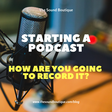 There are definitely different approaches here, and I feel it depends on who you are and what you want the feel of your show to be. By the way, I'm not going to simply recommend microphones and software here, this is more about techniques you can use regardless of how you record. My whole career is based around making sounds sound good. I'm a composer for TV and I offer podcast production (editing dialogue, treating audio etc) and audio branding services. Production quality is high on my list of priorities, because if it wasn't I feel it would have a knock on effect to those other areas. That's not to say that my approach is right for you. If you simply have a great idea and want to get started, you have a voice recorder in your pocket. Nowadays, smart phones have pretty good microphones, and there are free apps to record with and free apps to edit with (mental note: that's a whole other blog post for the future). Some podcast hosts even offer recording via their apps so you can record and publish seamlessly. I'm not sure if I've said this for a few posts, so I'll say it again: IT'S ALL ABOUT THE CONTENT. Listeners can be forgiving of lower production quality if your idea is good and well executed. That said, if you want to go the extra mile, it's only going to improve your prospects. My first little tip is about echo. Whatever you are recording on, whether it's your phone or the most expensive microphone ever built, if you record in a really echoey room it's going to be off-putting. Look around the place you want to record, are there lots of shiny surfaces? These surfaces are the nemesis of recording dialogue as sound reflects. If you have fewer shiny surfaces the chance of sound bouncing around and creating echo is reduced, simple! True story: I had a guest on Creative Cuppa recently. When she popped up on the screen she was in her wardrobe, surrounded by hanging clothes. She recorded on her hand held recorder and emailed her side of the chat to me afterwards, and it sounded AMAZING. My other tip is about guests or co-hosts. We're currently in a situation where recording in the same room isn't an option, so remote recording is the way to go. There are lots of ways to do this. One way is to record everyone involved over the internet, through whatever video conferencing programme you use (Zoom is able to record each person separately which is a bonus), and there are professional remote recording websites (at professional prices) for those who really want to go the extra mile. The only downside to this approach is that you are entirely at the mercy not only of your internet connection but of your co-hosts' and guests' connections too. I much prefer remote guests to record themselves. I talk through how with them beforehand, and generally if they don't have podcasting equipment, recording on their phone and sending it afterwards works just fine. I could go on about recording techniques all day long, but if you do your best to eliminate that echo, it'll make everything else a little easier. If you have any questions about this or any other post in the 'Starting A Podcast' series, feel free to contact me. Until next time, have a very happy Friday and a great weekend. Gareth Starting a podcast: will there be a structure to each episode?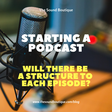 I previously mentioned that the simpler the idea, the better. If you listen to Creative Cuppa, it might sound like relaxed chats with creative people over a nice cuppa (that's the simple idea), but it's taken a lot of work to make it sound that simple. I decided before I started what the format was going to be: no longer than 15 minutes; audio ident --> theme music --> intro --> chat --> links --> outro. The 'chat' itself is researched. I don't give the guests a full set of questions, but before we hit record I'll run through the signposts I've come up with, the areas to chat around. It's not meant to be a formal interview, and I have to be prepared to let the conversation be flexible. Because, well, that's what a chat is. But here's the thing: the 'chat' part of the podcast is the only flexible part. It's surrounded by the structure, the walls that make the show recognisable. Why? Because whether we like it or not, we just love routine. Routine is what gives a podcast the 'comfort blanket' feeling. You're discovering new things in safe surroundings. So long as you decide what your format will be and stick to it, i.e. you are consistent, you'll find your show will become its own thing very quickly and people will begin to be drawn to it. If you have any questions about formats or any of the questions raised in this blog series, feel free to reach out. For now, have a very happy Friday and a fabulous weekend. Gareth Starting a podcast: who will be on your podcast?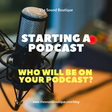 Will it be just you, or will there be guests? Will you have a co-host or do you prefer to fly solo? Questions like these are to do with time and money. If you are involving other people in your show, consider what will they get out of it. Whenever I collaborate I like to share ownership 50:50. It's my personal preference, but it means that we share the highs, the lows, the deadlines, the everything. And it's way more fun having that shared experience than inflicting your 'vision' on someone else every week. It encourages both parties to come up with ideas and more importantly to let good ideas in wherever they come from. Next on the agenda is the question of guests. Because you put the time in and decided what your podcast is going to be about (you did that didn't you?), you can start researching potential guests in that field. It's likely your podcast will be based on a subject you are passionate about, so don't be afraid to write a dream wish list of people you would love to have as guests. It's a bit like if you could have anyone round for dinner sort of thing, except it's entirely possible some of the people on that list will say yes. It's happened to me a few times and I've finished recording still pinching myself. Keep in mind though how being on your podcast will benefit your guests, dream wish list or not. Finally, if you want someone to edit your dialogue, or come up with bespoke music, or book guests on your behalf, be prepared to pay them. If this is a hobby for you, it doesn't mean it is for the people you want to be involved. For now, have a very happy Friday and a wonderful weekend. Gareth p.s. if you still haven't figured out what your podcast is going to be about, try our Podcast Format Starter form, it might help you gather your thoughts. There Is Another Way Podcast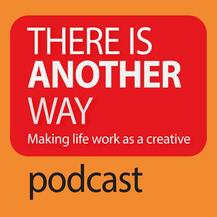 I recently had the pleasure of being a guest on Dr Neil Bruce's podcast 'There Is Another Way', which explores the world, life and creativity. We talk freelancing, creativity, rejection, networking and so much more. You can hear the episode by searching for 'There Is Another Way podcast' in your podcast app, or click in the artwork in this post. Whatever you're doing, have a happy and productive day. Gareth Starting a podcast: what will your podcast be about?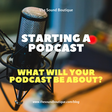 I ended the last blog post with the mantra: IT'S ALL ABOUT THE CONTENT. The podcast itself exists to deliver that content, so if you haven't decided what you want to talk about then it's time to stop and think about it. If you don't know yet, you might want to decide before you start (unless it's a podcast about improv 🤔). Even if you want to produce something that involves externalising thoughts that come into your head when you hit the record button, it's useful to know that ahead of time so you can figure out who your audience will be, potential guests, artwork and so on. Choose something that you are passionate about and keep it simple. Most successful podcasts have a really simple idea behind them, with all of the content feeding into that idea. If you can describe your idea in a short sentence you might just be on to something. If you do know what you want your podcast to be about but aren't sure how to go about it, listen to some podcast episodes relating to your topic. If you open your podcast app and search using the topic keyword, e.g. 'fashion' or 'photography' you'll see what's already out there. Put the time in and listen to some shows. Finally, in the podcast section of this website there's a form that might help you. Feel free to use it (but please don't hit submit if you don't want us to respond!). It's designed to help you get your thoughts organised, and may give you a spark of inspiration. Of course, if you have a budget and would like us to help you, hit that submit button. Until next time, have a very happy Friday and a wonderful weekend. Gareth Starting a podcast: why do you want to make a podcast?With over a million now in existence, it's a good time to consider starting a podcast. There are loads of resources online to help, and in the next few weeks I'll point you towards some of them. You might want to start a podcast to extend your brand, or talk about something that is close to your heart, or simply HAVE FUN. Whatever the reason, there's never been a better time to get going. It really doesn't take much to record something and publish it online to start building your audience. There's a lot to consider before you get going, however. The 'tip of the iceberg' questions I think that are important are: The question of why is something you should definitely answer before you start. Podcasts can be time consuming - especially when you're getting going - and there's nothing sadder than an abandoned channel. A podcast isn't just for Christmas etc.
If your answer is 'I just want to make a podcast', you need to reach past that and consider the next question: what will your podcast be about? I'll go into more detail about that next time, but please remember this: IT'S ALL ABOUT THE CONTENT. The podcast itself is merely the content delivery system. Like I said, I'll go further into that next time. For now, have a very happy Friday and a wonderful weekend. Gareth Podcast Production ServicesGreetings podlings!Last year co-producer Dan Watts and I started our first podcast via The Sound Boutique's audio brand 'screenless'. We learnt a lot about podcast production in that first series: how to properly plan a format; how to set up a work flow for production; what equipment works best; what to expect from guests and how to plan an interview; how to edit dialogue while keeping conversations sounding natural (and not like they're edited). We also wrote the audio ident and other incidental music, and mixed and mastered each episode ourselves. There's so much more involved, but you get the picture. Producing a podcast is made up of lots of little jobs, and we've covered them all. The whole process from strategising about making a podcast to publishing finished episodes...we've done that, and we're still doing it. Making A Soundtrack season 2 is now in production, and we can't wait to share it with you. The new podcast, Creative Cuppa, is going from strength to strength. We also realised that we now have a new skillset: podcast production services. Producing and editing your podcast can be tricky and time consuming. We can help with that. There are two main ways we are offering podcast production services. These are:
If you are thinking about starting a podcast or know someone who is, feel free to reach out and say hello via the 'Podcasts' section of this website. Have a great weekend. Gareth |
Details
AuthorPosts by Gareth Davies. Archives
November 2020
Categories
All
|
© 2024 The Sound Boutique Limited. All rights reserved.
Registered address: 11/12 Hallmark Trading Centre, Fourth Way, Wembley, Middlesex, United Kingdom, HA9 0LB.
Registered address: 11/12 Hallmark Trading Centre, Fourth Way, Wembley, Middlesex, United Kingdom, HA9 0LB.

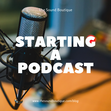
 RSS Feed
RSS Feed